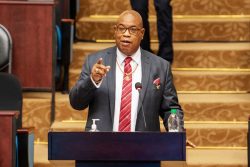CAIRO (Reuters) – Five hundred days after they overthrew Hosni Mubarak, Egyptians will finally have a new president today, the first they have chosen freely and who may well be from the Muslim Brotherhood, which Mubarak and fellow generals spent a lifetime fighting.
The result of last weekend’s run-off, due in an election committee news conference at 3 pm (1300 GMT), will be historic for Egypt and the Middle East. Many think Islamist Mohamed Morsy will become head of state of the biggest Arab nation, reshaping the region after decades of Western-backed military rule, even if the armed forces are not giving up their control just yet.
The Brotherhood may react angrily if it is instead Ahmed Shafik, a former air force commander and Mubarak ally. His victory many Egyptians, and millions across the region, would fear as a mortal blow to last year’s Arab Spring revolution, despite his assurances of also wanting an inclusive government.
After an anxious week of street protests at Cairo’s Tahrir Square and angry accusations between rivals of subverting the new democracy, the new president will emerge with fewer powers than the candidates, pruned by a first round of voting in May, had expected when the army promised civilian rule from July 1.
The ruling military council, which pushed Mubarak aside to appease the protesters in the streets, has just stripped the post of many powers and dissolved the Brotherhood-led parliament elected in January. Yet the presidency is still a prize, even if the vote will not end the power struggles over Egypt’s future.
An Islamist president of Egypt would be a major milestone for the Middle East, near unthinkable 18 months ago. It is far from confirmed. But the military, Brotherhood and other officials gave signs of expecting it will happen.
Brotherhood supporters camped out in Tahrir Square, where the revolution was won, were generally in festive mood, though fear of disappointment still nagged, after decades of rigged elections. In counterpoint, a few thousand rallied on Saturday in a middle-class Cairo suburb to declare support for the army.






